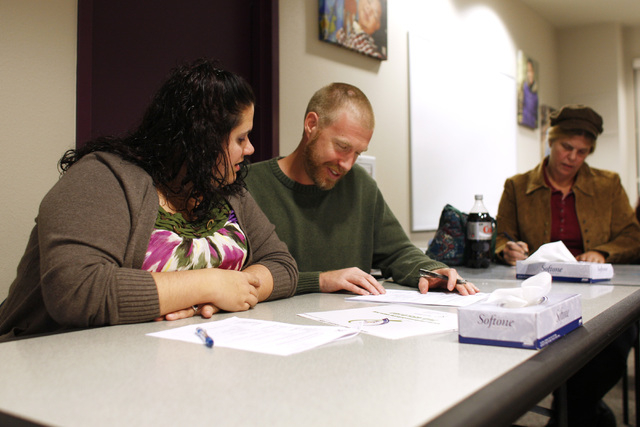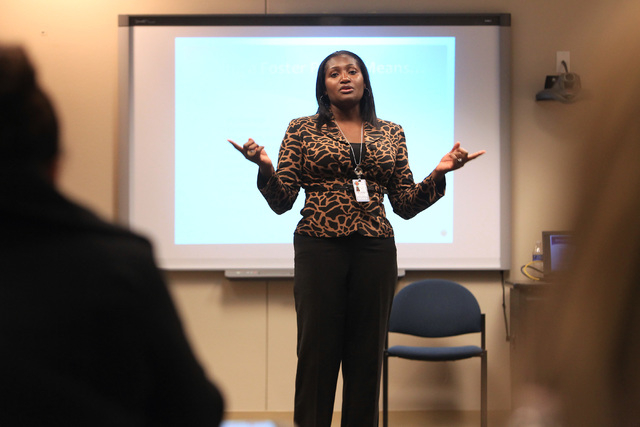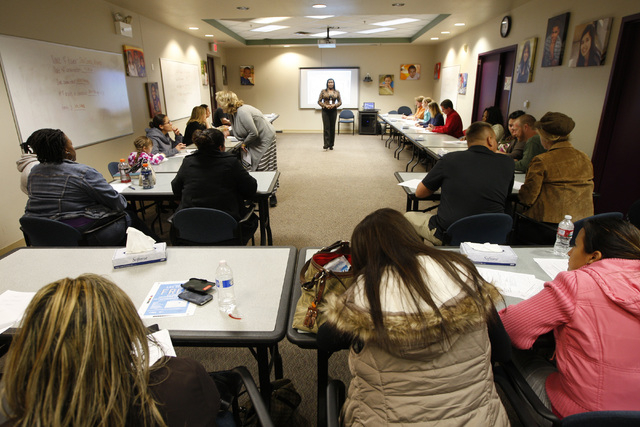Clark County moves to recruit more foster families
Clark County is moving to address its unmet “huge need” for quality foster parents, county officials say.
Several efforts are underway to multiply the number of families that can offer stable temporary homes to abused and neglected children.
“This is my personal dream: I would love for when we have to have children, that we have a couple of options that meet their needs, and we are not quite there now,” said Denise Parker, quality parenting initiative coordinator for the Clark County Department of Family Services. “We need to have a couple of options to be able to make the best match with the children.”
The urgent need for foster parents was underlined earlier this year when the population at Child Haven, the county’s emergency shelter for abused and neglected children, hit 83 and pushed the facility over its licensed capacity of 56 at the time. Its capacity is now 70, but on Wednesday it housed 97, well in excess of the new limit.
An increase in Child Protective Services investigations, foster families going on vacation and foster children being left without notice at the shelter by their caregivers contributed to last spring’s crowding.
Recruiting foster parents has always been a challenge for child welfare agencies nationwide, said Linda Spears, vice president of policy and public affairs for the Washington, D.C.-based Child Welfare League of America.
“I think it’s a challenge that’s not going to go away any time soon,” she said.
QUALITY FOSTER PARENTS
The best foster parents now with Family Services have experience and a record of successful placements with no complaints, allegations or licensing investigations, Parker said. They also work well with the agency and with birth parents.
“Every community has to define it their own way,” she said in November.
Clark County has about 3,000 children in the child welfare system at any given time and about 41 percent of those children are in foster care, county officials said. Family Services has about 1,200 licensed foster homes.
“One of the things I focus on is a call for action to our community and the need for foster parents, ” Sha’Londa Adams, a senior family services specialist, told a group of about 15 prospective foster parents during a Nov. 18 public informational session.
Adams talked about what it means to be foster parents and the need for caregivers to work with the children’s biological families, as the department’s primary goal is family reunification. Children in foster care belong to families in “crisis” and needing time to resolve their issues.
Family Services’ vision is to ensure children are safe while in foster care, she said.
“We want to make sure they are with healthy families,” she told the group of prospective foster parents. “We want you to view these children as your own.”
It’s not an easy job. Foster parent responsibilities may include taking children to multiple doctor appointments, parent visitations and therapy sessions.
“This is a huge commitment,” she said.
That’s why people don’t decide to become foster parents right away, Parker said. It can take as long as two years for an interested person to commit to become a foster parent.
“It takes a lot of self-reflection,” Parker said.
Family Services recently completed a series of informational sessions with Clark County employees. It will soon begin similar sessions with city workers in Las Vegas and Henderson. The agency also holds informational sessions for the public.
Family Services even sent recruiters to the Wet n’ Wild water park with beach balls last summer to attract prospective families, and is working on new public service announcements to focus more on fostering and less on adoption.
RECRUITMENT AND RETENTION
The agency is finalizing a recruitment plan that it hopes to roll out in January or early February to assist with targeted recruitment, Parker said. It will focus on identifying caregivers willing to take teenagers, siblings and special-needs children.
The effort is funded by a 5-year, $389,637 Diligent Recruitment Grant that Family Services received from the federal Department of Health and Human Services in 2010, said Samantha Charles, a Family Services spokeswoman. About $10,000 has been used for part of the efforts that helps identify families having similar characteristics as those considered quality foster parents.
The Casey Family Programs is also working with Family Services and with the state to provide help in best engaging birth parents and with leadership development, among other types of assistance, said Kristin Dizon, spokeswoman with the organization, based in Seattle.
“This support has also included discussion with (Family Services) about ways we might be able to assist with efforts on the recruitment and retention of foster parents,” Dizon said in a statement. “They have asked us to share research and practices from other jurisdictions.”
The Casey Family Programs is also helping Family Services update its plan to recruit foster parents, said Andre Wade, a community partnerships and engagement supervisor with Family Services.
Foster parent reimbursement varies from $680 to $770 per month, with supplements based on additional factors, county officials said.
Prospective foster parents must show financial and family stability. However, no minimum income requirement is specified, Clark County spokesman Erik Pappa said.
Family Services surveys foster parents who drop their license and try to make improvements based on what the parents say, Parker said.
“When you are looking at system improvements, that’s exactly what you do,” she said. “You take at look at things that work and don’t work.”
The agency will work with Child Trends, a national organization, to help identify issues repelling foster parents.
Kristi Beber, a foster parent who has had conflicts with Family Services, said “there’s been a huge shift in the way foster parents have been treated over the last 2 years.” As a result, there’s a “horrible” retention problem, she said.
She said that five years ago, when she started as a foster parent, there was a sense that foster parents were kept in the loop and that what they said mattered.
“Foster parents aren’t part of the team anymore,” Beber said last week. “Now, the caseworkers are so slammed … they no longer have the time to build a relationship with the foster parents.”
Foster families are choosing to close their licenses because support is lacking and “they are tired of the battle,” she said.
“They need foster parents desperately,” Beber said.
Wade said more retention data is needed to explain whether there is a retention problem. But Family Services has said in the past that there were 126 foster home closures from January to early September. Of those, 28 licenses were discontinued because of revocation or to drop caregivers who have not taken a placement for many years.
Wade said officials would be able to provide retention data this week.
Over the same months, Family Services licensed 145 foster families.
Of the prospective foster parents who attended the Nov. 18 informational session, all decided to advance to the pre-screening that begins the licensing process.
Among them were William and Christi Sleigher, who in the past were foster parents in Wisconsin.
When foster children first come into a new placement, they are usually sad, William said.
“But after a while you get to see them smile again,” he said. “You get to see them transition and to really be happy again.”
It’s a rewarding experience, he said.
“I just love children,” his wife added. “I love being around kids and being part of their lives.”
Contact Yesenia Amaro at yamaro@reviewjournal.com 702-383-0440.
Information sessions
Clark County foster care information session schedule. For more information, call 702-455-0181.
701 N. Pecos Road Building K
Dec. 2 , 6 to 7:30 p.m.
Dec. 13, 9 to 10:30 a.m.
Dec. 16, 6 to 7:30 p.m.
Dec. 27, 9 to 10:30 a.m.
Jan. 06, 6 to 7:30 p.m.
Jan. 10, 9 to 10:30 a.m.
Jan. 20, 6 to 7:30 p.m.
Jan 24, 9 to 10:30 a.m.



















